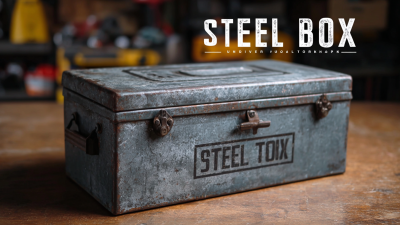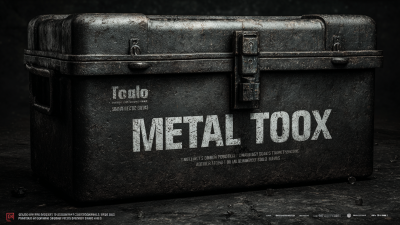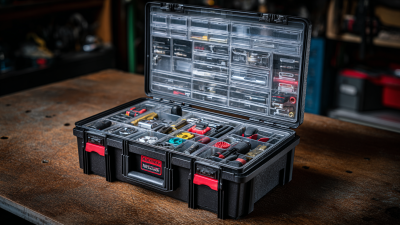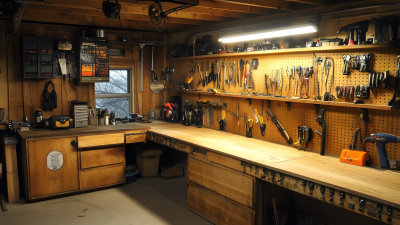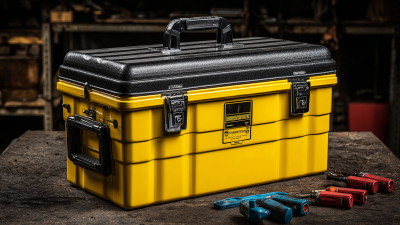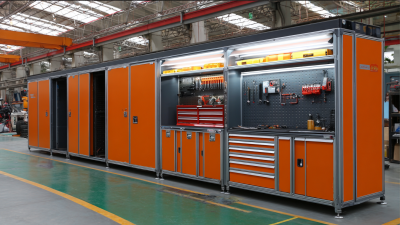In today's fast-paced world of DIY projects and professional renovations, having the right tools at your disposal is essential for success. A well-organized and comprehensive tool box set can significantly enhance productivity and efficiency. According to a report from the Market Research Future, the global tool storage market is expected to reach $6.3 billion by 2025, driven by the increasing number of homeowners engaging in home improvement activities and the growing demand from industries. Selecting the right tool box set is crucial for both amateur enthusiasts and seasoned professionals, as it not only helps in keeping tools organized but also ensures they are protected and easily accessible. This essential buying guide aims to equip you with the necessary insights and expert recommendations to make an informed decision when choosing the perfect tool box set for your workshop needs.

When selecting a tool box set for your workshop, it’s crucial to understand the different types available and their specific uses. There are several common categories of tool box sets, such as mechanic’s tool sets, DIY tool kits, and specialty sets.
 Mechanic’s tool sets typically include a range of sockets, wrenches, and ratchets designed for working on vehicles or machinery. These sets are essential for anyone who frequently handles automotive repairs or mechanical tasks, providing versatility and convenience in a compact package.
Mechanic’s tool sets typically include a range of sockets, wrenches, and ratchets designed for working on vehicles or machinery. These sets are essential for anyone who frequently handles automotive repairs or mechanical tasks, providing versatility and convenience in a compact package.
DIY tool kits, on the other hand, are geared towards homeowners and hobbyists. They usually contain a variety of hand tools like hammers, screwdrivers, pliers, and drills, making them ideal for basic home repairs or craft projects. Specialty tool sets are tailored for specific tasks, like plumbing or electrical work, and come equipped with the necessary tools to tackle those jobs effectively.
By understanding the distinct types of tool box sets, you can choose the one that best aligns with your workshop needs, ensuring that you have the right tools at your disposal for any project you take on.
When selecting the perfect tool box set for your workshop needs, several key features should be prioritized to ensure you make a wise investment. First, consider the material and durability of the box. Metal boxes typically offer greater sturdiness and longevity, while high-quality plastic can provide lightweight portability. Look for sets with reinforced corners and heavy-duty latches that can withstand frequent use, protecting your valuable tools from the wear and tear of a busy workshop environment.
Another vital factor is the organization system within the toolbox. A quality tool box set should come equipped with removable trays, compartments, or drawers that allow for easy access and organization of your tools. This not only saves time when searching for the right tool but also keeps your workspace tidy. Additionally, consider the size and portability of the toolbox—will you need a compact set for smaller projects, or a larger one to accommodate an extensive collection of tools? Balancing these features will lead you to the ideal tool box set that enhances your workshop efficiency and meets all your demands.
When considering the right tool box set for your workshop, it’s essential to first assess your specific needs. According to a report by MarketsandMarkets, the global tools market is projected to reach $928 billion by 2027, indicating increasing demand for specialized tool sets. Begin by evaluating the types of projects you undertake regularly. For instance, a woodworking enthusiast may require different tools compared to someone focused on automotive repairs. Identifying these distinctions will help you narrow down the essential tools that should be included in your box set.
Additionally, consider the available space in your workshop. A study by Statista reveals that 70% of hobbyists prefer a compact workspace due to limited areas, emphasizing the need for organized storage solutions. Look for tool boxes that offer modular designs or customizable sections to efficiently manage your tools without clutter. Lastly, prioritize durability and material quality based on the frequency of use. Reports indicate that high-quality tool boxes can significantly enhance productivity, as they not only protect your tools but also provide easy access when you need them the most.
Choosing the right tool box set hinges on understanding these fundamental aspects of your workshop needs.
When assembling an ideal tool box set for your workshop, it's crucial to include essential tools that cover a wide range of tasks. At the core of your tool box should be a reliable set of hand tools, which typically consists of various screwdrivers, pliers, wrenches, and hammers. These tools are indispensable for both minor repairs and intricate projects. A versatile selection, including flathead and Phillips screwdrivers, adjustable wrenches, and needle-nose pliers, ensures that you are prepared for any challenge, from assembling furniture to completing home improvement projects.

In addition to hand tools, power tools play a pivotal role in enhancing efficiency and precision in your workshop. A quality drill, ideally with multiple speed settings, can drill holes or drive screws into different materials seamlessly. A circular saw or a jigsaw can greatly expand your woodworking capabilities, allowing for intricate cuts and designs. Furthermore, incorporating safety gear, such as gloves and goggles, is essential to ensure your well-being while working on various projects. By prioritizing these fundamental tools, you’ll create a tool box set that not only meets your immediate workshop needs but also supports future endeavors.
When it comes to purchasing a toolbox set for your workshop, budgeting plays a crucial role in ensuring you strike the right balance between quality and cost. The first step in your budgeting process is to determine your specific needs. Are you a casual DIY enthusiast or a professional tradesperson? Understanding how often and for what purposes you'll be using these tools can help you decide how much to invest. Spending a bit more on a durable set may save you money in the long run, as you won't have to frequently replace low-quality tools.
Next, consider the various options available across different price ranges. While it can be tempting to opt for the cheapest toolbox set, remember that investing in quality tools can lead to better performance and longevity. Look for sets that offer the essentials without unnecessary extras that increase the price. Additionally, keep an eye out for tool sets on sale or discounts from reputable brands. By doing thorough research and setting a realistic budget, you can find the right toolbox set that meets your workshop needs without breaking the bank.
